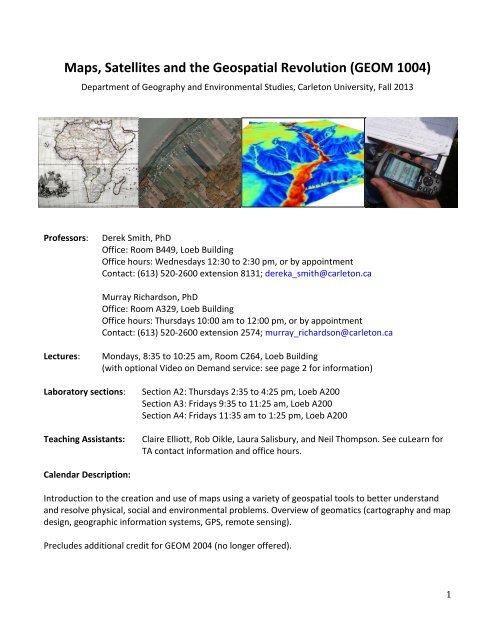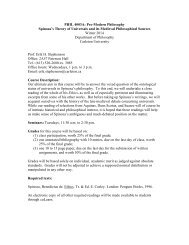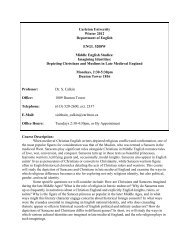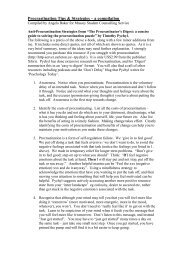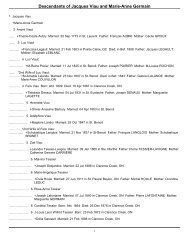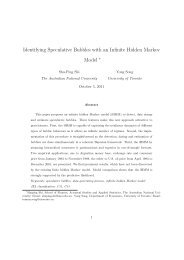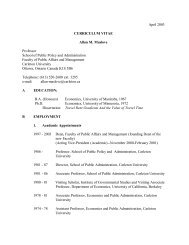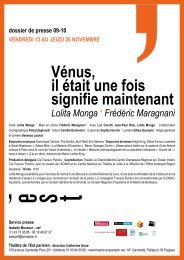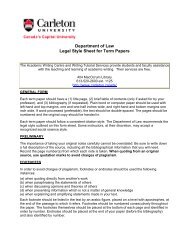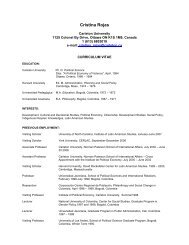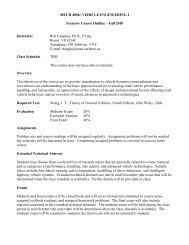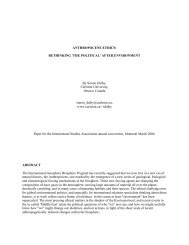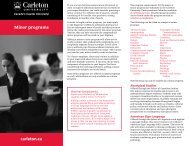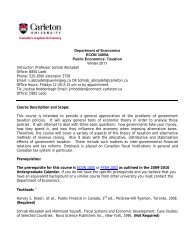Maps, Satellites and the Geospatial Revolution - Carleton University
Maps, Satellites and the Geospatial Revolution - Carleton University
Maps, Satellites and the Geospatial Revolution - Carleton University
Create successful ePaper yourself
Turn your PDF publications into a flip-book with our unique Google optimized e-Paper software.
<strong>Maps</strong>, <strong>Satellites</strong> <strong>and</strong> <strong>the</strong> <strong>Geospatial</strong> <strong>Revolution</strong> (GEOM 1004)Department of Geography <strong>and</strong> Environmental Studies, <strong>Carleton</strong> <strong>University</strong>, Fall 2013Professors:Derek Smith, PhDOffice: Room B449, Loeb BuildingOffice hours: Wednesdays 12:30 to 2:30 pm, or by appointmentContact: (613) 520-2600 extension 8131; dereka_smith@carleton.caMurray Richardson, PhDOffice: Room A329, Loeb BuildingOffice hours: Thursdays 10:00 am to 12:00 pm, or by appointmentContact: (613) 520-2600 extension 2574; murray_richardson@carleton.caLectures:Mondays, 8:35 to 10:25 am, Room C264, Loeb Building(with optional Video on Dem<strong>and</strong> service: see page 2 for information)Laboratory sections:Teaching Assistants:Section A2: Thursdays 2:35 to 4:25 pm, Loeb A200Section A3: Fridays 9:35 to 11:25 am, Loeb A200Section A4: Fridays 11:35 am to 1:25 pm, Loeb A200Claire Elliott, Rob Oikle, Laura Salisbury, <strong>and</strong> Neil Thompson. See cuLearn forTA contact information <strong>and</strong> office hours.Calendar Description:Introduction to <strong>the</strong> creation <strong>and</strong> use of maps using a variety of geospatial tools to better underst<strong>and</strong><strong>and</strong> resolve physical, social <strong>and</strong> environmental problems. Overview of geomatics (cartography <strong>and</strong> mapdesign, geographic information systems, GPS, remote sensing).Precludes additional credit for GEOM 2004 (no longer offered).1
Course Objectives: To become familiar with <strong>the</strong> core sub-disciplines in <strong>the</strong> broad field of geomatics, includingcartography, global positioning system applications, geographic information systems, <strong>and</strong> remotesensing. To develop an appreciation for how geospatial tools are used, <strong>and</strong> how <strong>the</strong>y are shaping <strong>the</strong> waywe make decisions. To develop practical, h<strong>and</strong>s-on skills in cartography, GPS mapping, GIS analysis, <strong>and</strong> using satelliteimagery <strong>and</strong> to learn how <strong>the</strong>y can be used to help solve social <strong>and</strong> environmental problems.Required Textbook:Jensen, John R., <strong>and</strong> Ryan R. Jensen (2012). Introductory Geographic Information Systems. Prentice HallSeries in Geographic Information Systems. Toronto: Pearson Education Canada.The textbook is available at <strong>the</strong> university bookstore <strong>and</strong> at Haven Books (43 Seneca St., 613-730-9888). You can also “rent” an e-book for 180 days for about $50. For this option, go to CourseSmart at“www.coursesmart.com” <strong>and</strong> follow <strong>the</strong> directions. The ISBN for <strong>the</strong> eBook is 9780321675736. Youwill need to use a credit card (please note that you will be charged in US dollars). A copy of <strong>the</strong>textbook will also be on reserve at <strong>the</strong> library for loans of up to two hours.Note: A detailed explanation of <strong>the</strong> required readings (including both textbook <strong>and</strong> some additionalreading material) on a week-by-week basis will be posted on cuLearn during <strong>the</strong> first week of class.Course Evaluation:Students will be evaluated on <strong>the</strong> basis of three components:Laboratory assignments, worth 50% of <strong>the</strong> final grade combined. There will be eight assignmentsin total. Only <strong>the</strong> best seven best assignment marks will be used to calculate this component of<strong>the</strong> final grade.An in-class mid-term exam, worth 15% of <strong>the</strong> final grade.A final exam, worth 35% of <strong>the</strong> final grade. The final exam will cover material from <strong>the</strong> entireclass.Course Schedule <strong>and</strong> Required Readings – See page 6 of this course outline for details.Video on Dem<strong>and</strong> Option:Arrangements have been made to have <strong>the</strong> Monday lectures recorded <strong>and</strong> made available as anoptional Video-on-Dem<strong>and</strong> (VOD) service. VOD lectures are usually available within 24 hours of <strong>the</strong>irrecording. To subscribe to <strong>the</strong> VOD service, add section “AOD” (CRN 35123) to your course registration.The VOD service fee is $50 <strong>and</strong> will be added to your student account. After <strong>the</strong> close of registrationVOD service can be added here https://vod.cuol.ca/registration/sign-me-up.2
Once subscribed, <strong>the</strong> VOD service can be accessed from https://vod.cuol.ca/vod. Access to individuallectures on a Pay-Per-View basis can also be obtained from this site.Please note: <strong>the</strong> purpose of offering VOD service for lectures is to allow students to view lectures thatare missed due to illness or o<strong>the</strong>r reasons beyond <strong>the</strong>ir control, <strong>and</strong> to allow students to review lecturematerial in preparation for <strong>the</strong> mid-term <strong>and</strong> final exam. It is not intended as a replacement forattending lecture.Purpose of Lectures, Readings <strong>and</strong> Assignments:The lectures, readings, <strong>and</strong> laboratory sessions <strong>and</strong> assignments are designed to complement <strong>and</strong>reinforce each o<strong>the</strong>r in meeting <strong>the</strong> course’s learning objectives. Class lectures provide <strong>the</strong>fundamental structure for <strong>the</strong> course, including <strong>the</strong> presentation of key concepts <strong>and</strong> issues, casestudies, audiovisual material, <strong>and</strong> additional content not found in <strong>the</strong> textbook. The required readingsin <strong>the</strong> textbook provide an overview of course topics, fur<strong>the</strong>r examples, <strong>and</strong> additional material notaddressed in class lectures. The laboratory assignments provide <strong>the</strong> opportunity to apply key methods<strong>and</strong> concepts introduced in <strong>the</strong> lectures <strong>and</strong> readings. An underst<strong>and</strong>ing of both class lecture material<strong>and</strong> required readings are needed to complete each assignment successfully.The mid-term exam <strong>and</strong> <strong>the</strong> final exam will include material from <strong>the</strong> required readings <strong>and</strong> classlectures, including audio-visual materials. Course content that is exclusive to <strong>the</strong> laboratory sessionswill not be included in <strong>the</strong> exams. A cuLearn web site for this course has been made for students. Hereyou can access <strong>the</strong> course outline, lecture slides, assignment grades, occasional announcements, <strong>and</strong>contact information <strong>and</strong> office hours for <strong>the</strong> instructors <strong>and</strong> teaching assistants (TAs). To log in, go tocuLearn at https://cuLearn.carleton.ca/. Lecture slides will be posted on cuLearn for your reference.Please note that lecture slides provide only a partial summary of <strong>the</strong> lecture material presented inclass. Past experience indicates that class attendance has a significant impact on scores on <strong>the</strong> midterm<strong>and</strong> final exams.Learning Support Services Incentive ProgramThis course has been registered in <strong>the</strong> study skills Incentive Program offered through Learning SupportServices (LSS), which gives you an opportunity to earn bonus marks for your final grade. For each StudySkills workshop you attend throughout <strong>the</strong> term, you will earn a 1 percent bonus mark, up to amaximum of 5 percent. If a student has not completed 5 workshops by end of term, LSS will notprovide a 1-on-1 session as a substitution. (Please note that it is <strong>the</strong> student’s responsibility to sign infor workshops, if you do not sign <strong>the</strong> attendance record, you will forfeit <strong>the</strong> bonus mark for yourworkshop participation.) The goal of attending study skills workshops in LSS is to exp<strong>and</strong> <strong>and</strong> refineyour academic skill set. There are 15 different workshops to choose from. Topics include: AcademicReading, Balancing Work <strong>and</strong> School, Critical Thinking, Note-Taking in Lectures, Preparing for Exams,<strong>and</strong> Writing Reports, among o<strong>the</strong>rs. Workshops will become available starting September 16 <strong>and</strong> mustbe completed by November 29 to receive credit for <strong>the</strong> Incentive Program. You will need to bring your<strong>Carleton</strong> ID card with you to each workshop.3
All workshops are held in room 402 in <strong>the</strong> MacOdrum Library. To see <strong>the</strong> complete workshop schedule<strong>and</strong> to preregister (although not m<strong>and</strong>atory) please login to <strong>Carleton</strong> Central, <strong>and</strong> click on <strong>the</strong> SASCLearning Support Services – workshops link under <strong>the</strong> mySuccess tab. Also note that if you attend 5 ormore workshops you will earn your Skills for Academic Success Certificate which can be added to yourco-circular record (but for this course a maximum of 5 bonus points can be earned).Laboratory Sessions <strong>and</strong> Assignments:Laboratory assignments provide an opportunity to apply course concepts <strong>and</strong> get h<strong>and</strong>s-on experienceusing geomatics tools. Assignments will be introduced during laboratory sessions by your teachingassistant, which usually includes a brief review of relevant course material <strong>and</strong> tips on how tosuccessfully complete <strong>the</strong> assignment. While <strong>the</strong> assignments have been designed by <strong>the</strong> instructors,<strong>the</strong> TAs are responsible for organizing <strong>and</strong> running <strong>the</strong> laboratory sessions, for providing assistanceduring <strong>the</strong>ir office hours, <strong>and</strong> for grading assignments. Please seek assistance as needed, but keep inmind that <strong>the</strong>ir role is to facilitate learning <strong>and</strong> not to provide answers.Assignment Scheduling <strong>and</strong> Due DatesThere are eight laboratory assignments required for this course, which are all of equal weight. Allassignments must represent individual work that is completed independently. Any form of plagiarismwill be treated as a serious instructional offence in accordance with university policy (see below).Students should come to laboratory sessions having done <strong>the</strong> required reading <strong>and</strong> ready to participatein discussions. Please bring your textbook <strong>and</strong> class notes to laboratory sessions.The introduction, explanation <strong>and</strong> submission of laboratory assignments will adhere to <strong>the</strong> schedule at<strong>the</strong> end of this outline. Please note that <strong>the</strong>re will be no laboratory session <strong>the</strong> first week of class - yourfirst laboratory session will be on September 18, 19 or 20, depending on which laboratory section youare in. Please review <strong>the</strong> class schedule on page 8 carefully, <strong>and</strong> check <strong>the</strong> due dates specified on <strong>the</strong>assignment h<strong>and</strong>outs. The topic affiliated with a laboratory assignment will be introduced in <strong>the</strong> classlecture <strong>and</strong> required readings. Next, <strong>the</strong> assignment will be explained in <strong>the</strong> laboratory session. Finally,students will be expected to submit <strong>the</strong>ir completed assignments in accordance with <strong>the</strong> assigned duedates. Please be sure to carefully note <strong>the</strong> due date that is specified in <strong>the</strong> assignment h<strong>and</strong>out.Please refer to details regarding laboratory assignments <strong>and</strong> o<strong>the</strong>r laboratory activities provided in <strong>the</strong>course schedule on page 8.Submission <strong>and</strong> Grading of AssignmentsLaboratory assignments must be h<strong>and</strong>ed directly to your TA at <strong>the</strong> beginning of your laboratorysessions. Assignments submitted on <strong>the</strong> correct day but after <strong>the</strong> laboratory session will be consideredone day late. The penalty for late assignments is a 10 percent per day past <strong>the</strong> assigned due date(including weekends), unless accompanied by appropriate documentation such as an official medicalnote. Medical notes must specify <strong>the</strong> period of illness. To avoid penalty, <strong>the</strong> circumstances of a late4
assignment must be discussed in person or by email with your TA within three days of your return tocampus. There are no exceptions to this late policy. In accordance with <strong>the</strong> Undergraduate Calendar,December 9, 2013, is <strong>the</strong> final day to submit assignments.Submit <strong>the</strong> original copy of your assignment to your TA, but please always keep your own copy ofsubmitted assignments until after final grades have been posted for <strong>the</strong> course. For written answers toquestions in <strong>the</strong> assignments, use complete sentences that demonstrate your ability to convey ideas ina clear <strong>and</strong> grammatically correct manner. Each assignment must be typed <strong>and</strong> should have a headerwith a title, your name, your student number, <strong>the</strong> course number, your teaching assistant’s name, <strong>and</strong><strong>the</strong> date of submission. TAs will mark <strong>the</strong> assignments <strong>and</strong> post grades on <strong>the</strong> course’s CuLearn site.Students are responsible for checking <strong>the</strong>ir assignment grades on CuLearn. Any questions regardingassigned grades must take place in written form (i.e., email) within 10 days after <strong>the</strong> day that <strong>the</strong>assignments are returned in <strong>the</strong> laboratory. Students who fail to meet <strong>the</strong> above-outlined courserequirements may be assigned an FND grade. Final grades are subject to <strong>the</strong> Dean’s approval.Late assignments are strongly discouraged, but can be submitted through <strong>the</strong> drop-box slot located atRoom B342 of <strong>the</strong> Loeb Building. The name of <strong>the</strong> professors <strong>and</strong> your TA must be on <strong>the</strong> cover of yourassignment. In addition, you must also follow <strong>the</strong> drop-box policy:• Send an email to your TA, with a copy of your assignment attached, immediately after you drop<strong>the</strong> original paper copy of your assignment in <strong>the</strong> drop box.• It is your responsibility to follow-up with your TA if needed to ensure that your email/assignmenthas been received.• The paper copy of your assignment in <strong>the</strong> drop box will be <strong>the</strong> version used for marking purposes;<strong>the</strong> emailed copy will be used for verification purposes. The date when materials submittedthrough <strong>the</strong> drop-box is not recorded, so sending <strong>the</strong> assignment as an email attachment is veryimportant to ensure that <strong>the</strong> correct late penalty is applied.• Always put <strong>the</strong> name of your professors <strong>and</strong> your TA on assignments submitted through <strong>the</strong> dropbox.• If <strong>the</strong> drop-box policy is not followed, <strong>the</strong> assignment will be marked as being received <strong>the</strong> day itis picked up from <strong>the</strong> drop-box, which could be one or more days after <strong>the</strong> assignment is droppedoff.Mid-term Examination Policy:The mid-term examination will be carried out in our regular lecture classroom <strong>and</strong> timeslot. If astudent misses <strong>the</strong> mid-term exam for a legitimate <strong>and</strong> unforeseen reason (e.g., illness) <strong>and</strong>appropriate documentation is provided (with contact information that allows for verification), this willresult in <strong>the</strong> re-weighting of <strong>the</strong> final exam to include <strong>the</strong> mid-term exam marks (i.e., <strong>the</strong> final examwould <strong>the</strong>n be worth 15% + 35% = 50% of <strong>the</strong> student’s final grade). This will only occur if <strong>the</strong> properofficial medical or o<strong>the</strong>r applicable documentation is provided, <strong>and</strong> which indicates <strong>the</strong> specific date ortime period when a student is not able to participate in academic activities. Accommodations will beconsidered for students who are incapacitated or o<strong>the</strong>rwise unable to take part in academic activitieson <strong>the</strong> day of <strong>the</strong> mid-term <strong>and</strong>/or <strong>the</strong> day before. In all o<strong>the</strong>r cases, students are expected to write5
<strong>the</strong> mid-term exam. If inadequate documentation is provided, <strong>the</strong> resulting grade for a missed midtermwill be zero. The final exam will be scheduled during <strong>the</strong> formal examination period byExamination Services. For any questions concerning <strong>the</strong> scheduling or procedures for <strong>the</strong> final exam,please consult <strong>the</strong>ir web page (http://www2.carleton.ca/ses/exams/).Instructional <strong>and</strong> Conduct Offences<strong>Carleton</strong> <strong>University</strong> has clear <strong>and</strong> firm policies regarding instructional <strong>and</strong> conduct offences.Instructional offences include among o<strong>the</strong>r activities cheating, contravening examination regulations,plagiarism, submitting similar work in two or more courses without prior permission, <strong>and</strong> disruptingclasses. Conduct offences apply in areas of discrimination <strong>and</strong> sexual harassment. Fur<strong>the</strong>r informationabout <strong>the</strong> <strong>University</strong>’s Academic Integrity Policy can be found at:http://www2.carleton.ca/studentaffairs/academic-integrity.Plagiarism is one kind of instructional offence. Examples of plagiarism include:• Reproducing or paraphrasing portions of someone else’s published or unpublished material, <strong>and</strong>presenting <strong>the</strong>se as one’s own without proper citation or reference to <strong>the</strong> original source;• Submitting an assignment written, in whole or in part, by someone else;• Using ideas or direct, verbatim quotations, or paraphrased material, concepts, or ideas withoutappropriate acknowledgment in any academic assignment;• Failing to acknowledge sources through <strong>the</strong> use of proper citations when using ano<strong>the</strong>r’s works<strong>and</strong>/or failing to use quotation marks;• H<strong>and</strong>ing in “substantially <strong>the</strong> same piece of work for academic credit more than once without priorwritten permission of <strong>the</strong> course instructor in which <strong>the</strong> submission occurs.”For more information on how to cite sources, refer to <strong>the</strong> library web page “Citing Your Sources”available at http://www.library.carleton.ca/help/citing-your-sources. Plagiarism is a serious offencewhich cannot be resolved directly with <strong>the</strong> course instructor. The Associate Deans of <strong>the</strong> Facultyconduct a rigorous investigation, including an interview with <strong>the</strong> student, when an instructor suspectsa piece of work has been plagiarized. Penalties are not trivial. They include sanctions ranges from agrade of zero for <strong>the</strong> assignment to suspension from your program of study.Academic Accommodation:You may need special arrangements to meet your academic obligations during <strong>the</strong> term. For anaccommodation request <strong>the</strong> processes are as follows:Pregnancy obligation: write to us with any requests for academic accommodation during <strong>the</strong> first twoweeks of class, or as soon as possible after <strong>the</strong> need for accommodation is known to exist. For moredetails visit <strong>the</strong> Equity Services website: http://www2.carleton.ca/equity/.Religious obligation: write to us with any requests for academic accommodation during <strong>the</strong> first twoweeks of class, or as soon as possible after <strong>the</strong> need for accommodation is known to exist. For moredetails visit <strong>the</strong> Equity Services website: http://www2.carleton.ca/equity/.6
Academic Accommodations for Students with Disabilities: The Paul Menton Centre for Students withDisabilities (PMC) provides services to students with Learning Disabilities (LD), psychiatric/mentalhealth disabilities, Attention Deficit Hyperactivity Disorder (ADHD), Autism Spectrum Disorders (ASD),chronic medical conditions, <strong>and</strong> impairments in mobility, hearing, <strong>and</strong> vision. If you have a disabilityrequiring academic accommodations in this course, please contact PMC at 613-520-6608 orpmc@carleton.ca for a formal evaluation. If you are already registered with <strong>the</strong> PMC, contact yourPMC coordinator to send us your Letter of Accommodation at <strong>the</strong> beginning of <strong>the</strong> term, <strong>and</strong> no laterthan two weeks before <strong>the</strong> mid-term exam or any assignment requiring accommodation (ifapplicable). After requesting accommodation from PMC, meet with your instructor to ensureaccommodation arrangements are made. Please consult <strong>the</strong> PMC website for <strong>the</strong> deadline to requestaccommodations for <strong>the</strong> formally-scheduled final exam at http://www2.carleton.ca/pmc/new-<strong>and</strong>current-students/dates-<strong>and</strong>-deadlines/.Please note – if you do not meet with your instructor to discuss your letter of accommodation wecannot guarantee your required accommodation. It is your responsibility to approach one of us aboutthis. Accommodations for <strong>the</strong> final examination, however, will be managed by examination services.You can visit <strong>the</strong> Equity Services website to view <strong>the</strong> policies <strong>and</strong> to obtain more detailed informationon academic accommodation at http://www2.carleton.ca/equity/.Campus Resources for StudentsStudent Experience Office http://www2.carleton.ca/seo/Health <strong>and</strong> Counselling Services http://www.carleton.ca/healthInternational Student Services Office http://www.carleton.ca/issoStudent Academic Success Centre http://www.carleton.ca/sasc7
COURSE SCHEDULE, GEOM 1004, Fall 2013 (details of <strong>the</strong> required readings will be posted on cuLearn). Note that each class weekbegins with <strong>the</strong> lecture, followed by a laboratory meeting later in <strong>the</strong> week, depending on when your own section is held.Week Date Lecture topic Laboratory session1 September 9Introduction: <strong>Maps</strong>, satellites <strong>and</strong> <strong>the</strong> geospatialrevolutionNo laboratory meeting2 September 16 Thinking spatially – key concepts Introduction - Using Google Earth <strong>and</strong> GPS3 September 23Earth models, georeferencing <strong>and</strong> <strong>the</strong> global positioningsystem (GPS)1. Mapping locations with GPS4 September 30 An introduction to cartography 2. Using topographic maps5 October 7 An introduction to geographic information systems (GIS) 3. Spatial <strong>and</strong> attribute queriesOctober 14 Statutory holiday – no lecture No laboratory meeting6 October 21 Mapping spatial patterns 4. Mapping spatial patternsOctober 287 November 4 Midterm ExamFall Break – No Classes5. Geoprocessing 1: Site selection using vectorbuffering <strong>and</strong> overlays8 November 11 Spatial analysis using GIS 6. Geoprocessing 2: Change detection9 November 18An introduction to aerial photography <strong>and</strong> remotesensing7. Introduction to remote sensing image analysis10 November 25 L<strong>and</strong>cover mapping with remote sensing 8. Geographic analysis <strong>and</strong> problem solving11 December 2The social, cultural <strong>and</strong> political dimensions ofgeomaticsExam review12 December 9 Conclusion <strong>and</strong> review No laboratory meetingPlease note that lecture topics <strong>and</strong> assignment details are subject to change at <strong>the</strong> discretion of <strong>the</strong> instructors.8


